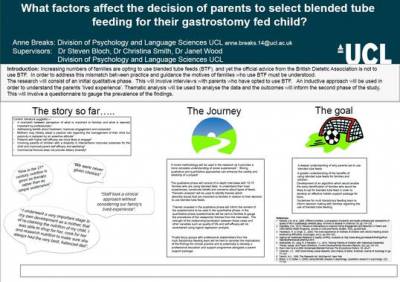| Anne Breaks, Steven Bloch, Christina Smith, Janet Wood |
| Sept 2014 - Sept 2019 |
 |
| Download poster |
Summary: Some children are unable to swallow safely or may have gastric problems or neurological difficulties that mean they are unable to meet their nutritional requirements by oral intake alone. Such children may require tube feeding via a gastrostomy. Usually commercially prepared formula feeds are used to feed these children. However, more families are opting to use blended tube feeds. These feeds are made using ‘family food’ blended to a smooth consistency and then passed down the feeding tube. The official advice from the British Dietetic Association is not to use a blended diet, but despite this increasing numbers of families is opting to do so. In order to address this mismatch between practice and guidance the motives of families who use a blended diet must be understood. Following a comprehensive review of the literature several key issues relevant to the investigation were revealed. Firstly studies investigating adherence to medicines describe the importance of addressing beliefs and concerns about treatment/medicine. Horne (1999) found that negative views of medication focused on potential harmful effects rather than a lack of efficacy/benefit. With regard to commercial formula feeds discussion has tended to focus on the negative effects rather than questioning whether the feeds were beneficial.1 Secondly, mothers may initially adopt a passive role regarding the management of their child but passivity is replaced by an assertive attitude which in turn may relate to the fact that patients with higher self-efficacy are more likely to engage.2 This theme of self-efficacy and engagement was also highlighted by Machalicek et al. (2015), who found that involving parents of children with a disability in interventions improved outcomes for the child and improved parent self efficacy and wellbeing.3 The third key issue came from Morrow et al. (2008), who found that there appears to be a mismatch between perceptions of what is important to families and what is deemed important by professionals.4 Finally Cowpe et al. 2014 found positive experiences were cited when parents had good quality information, which facilitated informed decision-making.5 In order to determine if the issues identified in the literature review reflected professional opinions paediatric dietitians and paediatric dysphagia specialist speech and language therapists were asked to share their experience of families using a blended diet, their views on drivers/motivator of families who use a blended diet and about the possible benefits and challenges. The mismatch between what was important to families and professionals described in the literature was echoed in the discussions. A change in the locus of control was noted – some parents were reluctant to ‘admit’ they were using blended diets, combined with the sense from dieticians that they had less control over the intake of a child who had blended diet. The need for families to have a sense of hope and progression was discussed. Support and information were key themes, which relate to the themes of self-efficacy and the need for information found in the literature review. |
References 1. Horne, R., Weinman, J. & Hankins, M., 1999. The beliefs about medicines questionnaire. Psychology and Health, 14, 1–24. 2. Hewetson, R. & Singh, S., 2009. The lived experience of mothers of children with chronic feeding and/or swallowing difficulties. Dysphagia, 24(3), 322–332. 3. Machalicek, W., Lang, R. & Raulston, T.J., 2015. Training Parents of Children with Intellectual Disabilities: Trends, Issues, and Future Directions. Current Developmental Disorders Reports, 2(2), 110–118. 4. Morrow, A. M. et al., 2008. Different priorities: a comparison of parents’ and health professionals' perceptions of quality of life in quadriplegic cerebral palsy. Archives of Disease in Childhood, 93, 119–125. 5. Cowpe, E., Hanson, B. & Smith, C.H., 2014. What do parents of children with dysphagia think about their MDT? A qualitative study. Bmj Open, 4(10), e005934–e005934. |
 Close
Close

